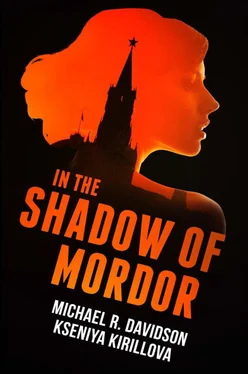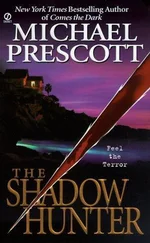Michael R. Davidson
Kseniya Kirillova
IN THE SHADOW OF MORDOR
(Под сенью Мордора)
This book is dedicated to the brave Russian dissidents who face daily persecution, imprisonment, and even death. Their battle is freedom’s battle, and they carry the torch for us all.
“Once to every man and nation,
Comes the moment to decide,
In the strife of truth with falsehood,
for the good or evil side.”
James Russel Lowell
In the development of this novel the authors were inspired in part by actual events that have been amply reported in the press and literature.
Having made this clarification it is important to emphasize that this is a work of fiction and the situations described, as well as the characters and their actions are imaginary.
Michael R. Davidson is a former officer of the Central Intelligence Agency, and having reviewed the manuscript, as required by law, the CIA requires the following disclaimer:
“All statements of act, opinion, or analysis expressed are those of the author and do not reflect the official positions or views of the CIA or any other US Government agency. Nothing in the contents should be construed as asserting or implying US Government authentication of information or Agency endorsement of the author’s views. This material has been reviewed by the CIA to prevent the disclosure of classified information.”
Not being able to go home to your own country, to see your parents, to bury your loved ones or just visit their graves — these are probably the smallest of sacrifices today’s dissident exiles must bear. This is especially true for those who actively come out against the war the Kremlin unleashed against Ukraine. Some people sacrificed their freedom simply for posting opposing views of the war in social media. The reality is that everyone, every day is forced to endure brutality, slander, persecution and more.
In this book we created a collective image of the Russian dissident. There is some exaggeration for dramatic effect — not every non-conforming journalist is murdered, although the journalistic profession in Russia has truly become dangerous. This is hardly a new situation. In Russia today, just as it has been in Russia throughout the centuries, particularly in the last century, the lives of the very best people are deliberately destroyed.
However, the purpose of our book is not simply to depict the inequities of life. Life is and always has been basically unfair. Fortunately, people who have “experienced Russia” are cynical enough to have a good laugh at quests for justice. Natives of the former USSR learned a long time ago to substitute the word “price” for the word “injustice.”
All of these injustices are simply the price one pays to have a clear conscience. It’s the fee you must pay for the moral right to consider yourself NOT a scoundrel. And the price is exactly as much as you have paid, and not a gram less. That’s how it has to be; you can’t accomplish anything otherwise.
This is the essence of the chronic age-old curse of Russia. The Kremlin’s crimes impose on the most ordinary people — not the military or civil servants, but simply common people — a choice between extremes: between a feat of bravery and an act of depravity. The pathological demands of this criminal regime pull into its orbit as many ordinary people as possible, drawing them into mutually assured participation in terrible acts and leaving little opportunity to avoid the bad choice. For some categories of people — soldiers, officials, journalists, human rights activists, teachers, judges, etc., there is no choice at all.
In a country where a feat of bravery is required NOT to become an accomplice to a morally repugnant act, a third option is often unavailable. People are forced to perform brave and sacrificial acts, not to become heroes, but to avoid complicity in pervasive collective crimes, simply because “they couldn’t do anything else.”
How do you explain to a resident of a civilized western country that a government can drive ordinary people into the most inconceivable and unacceptable of situations, demanding that they approve of the most savage criminal acts, while stigmatizing disapproval and dissent itself as a crime, where you are deemed a criminal for simply clicking “like” on a social media page? And those people for whom a clear conscience outweighs fear or hypocritical conformity are forced to sacrifice everything — their security, their homeland, and their freedom–just to escape an overall “presumption of guilt,” to rid themselves of their portion of the guilt that surrounds them and with which they find it impossible to live. Not because they dreamed of heroic deeds, but just to be able to keep living with a clear conscience. For this, they at times must pay an exorbitantly high price.
It is truly horrifying that from time immemorial Russia has forced her citizens (both her own and others) to pay too high a price for things that usually cost less in normal countries. The price of victory in World War II was a sea of soldiers’ blood, ineptly used as cannon fodder, and then another sea of blood and sweat from those who managed to return from German captivity only to be sent to the GULAG — all to calm the paranoid fears of an arrogant “leader.” And so invalids are sent to Valaam [1] …disabled veterans, whose continuing need for more support was unwelcome evidence of the Soviet state’s inability or unwillingness to adequately provide for all citizens’ needs. During the late 1940s and 1950s disabled veterans were dispersed from Moscow and other large cities for forced resettlement in remote areas. According to Fieseler (2006:51), kolkhoz supervisors in rural areas, in order to shed inefficient disabled workers, sometimes turned them in as “parasites;” such workers were then deported, presumably to labor camps. Penal camps were established in the Soviet Union for disabled prisoners and disabled veterans of the Russian Civil War and the two World Wars. The most infamous of these is the Spasskaya labor colony near Karaganda, Kazakhstan, to which 15,000 disabled prisoners were sent in the late 1940s and early 1950s (Solzhenitsyn 1985). Similarly, disabled veterans of the Second World War were secretly exiled from Leningrad (now St. Petersburg) and Leningrad oblast’ to the Valaam archipelago, in the Republic of Karelia (Russian Federation). Valaam and the fate of those veterans are still shrouded in mystery (Fefelov 1986:51-57).
so they won’t be eyesores for the “leader.” The price for the industrial surge: millions dead from hunger, tortured and exhausted from hard labor in the camps, where even children and teenagers were made to work. Stiffened corpses in the frozen tundra. The suffocating train cars filled with people of different nationalities, such as the Crimean Tatars, who died before reaching their place of deportation. That is the “price” paid for the Soviet Union whose collapse has been called “the greatest geopolitical catastrophe.”
And that’s precisely the price that Russia is now making Ukraine pay. The price for freedom, for moving toward Europe, is war. Tanks, BUKs, grad missiles, mortars attacks on residential homes, destroyed Debaltseve, strikes on Mariupol, torture in the cellars of occupied Donetsk. That’s the price people are paying for their desire to choose their own path, their own vector of development, their own identity. Not a gram less.
Читать дальше













